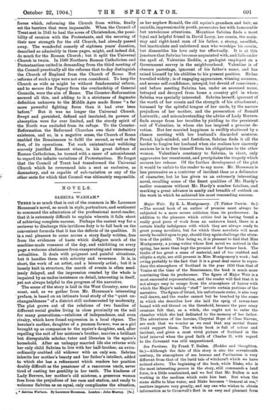Major Weir. By K. L. Montgomery. (T. Fisher Unwin. 6s.)
—The second book of an author of promise must always be subjected to a more severe criticism than its predecessor. In addition to the pleasure which critics feel in having found a really good piece of work from an unknown hand, there is a certain kindly indulgence with which they are always ready to greet young novelists, but for which these novelists will most surely be called upon to pay, should they again challenge the atten- tion of the public. This being so, it is pleasant to find that Miss Montgomery, a young writer whose first novel we noticed in the spring, has more than kept the promise of her former book. The faults of too great a mass of material, and of too crabbed and elliptic a style, are still present in Miss Montgomery's work ; but owing probably to the fact that it is a great deal easier to repro- duce the atmosphere of Scotland in the year 1650 than that of Venice at the time of the Renaissance, the book is much more convincing than its predecessor. The figure of Major Weir is a most successful representation, and the reader will find that it is not always easy to escape from the atmosphere of horror with which the Major's unholy " staff " invests certain portions of the narrative. The figure of Grizel, his unfortunate sister, is also very well drawn, and the reader cannot but be touched by the scene- in which she describes how she laid the sprig of rowan-tree bound with red thread on the threshold, because the poor crazy creature felt that, as a witch, she ought not to enter the chamber which she had dedicated to the memory of her father. The adventures of the heroine, Chrystal Hope of Clear Havens,. are such that we wonder as we read that any mortal frame could support them. The whole book is full of colour and incident, and gives a most vivid picture of Scotland in the brief interval when the good faith of Charles II. with regard to the Covenant was still unquestioned.










































 Previous page
Previous page